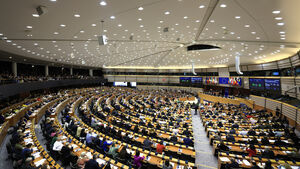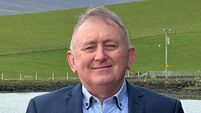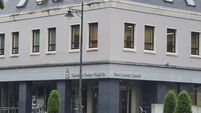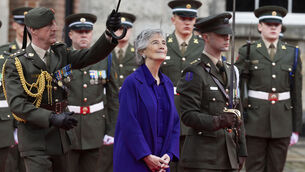Election 2024: Voters in Midlands North-West have plenty of choice

Five seats in the European Parliament are up for grabs in the Ireland Midlands-North-West constituency next Friday. Picture: AP Photo/Geert Vanden Wijngaert
5
Justin Barrett (National Party); Niall Blaney (Fianna Fáil); Anthony Cahill (The Irish People); Nina Carberry (Fine Gael); Peter Casey (Independent); Lisa Chambers (Fianna Fáil); Barry Cowen (Fianna Fáil); Luke 'Ming' Flanagan (Independent); Stephen Garland (Independent); Michelle Gildernew (Sinn Féin); Rory Hearne (Social Democrats); Charlotte Keenan (Independent); Hermann Kelly (Irish Freedom Party); Fergal Landy (Labour); Chris MacManus (Sinn Féin); Margaret Maguire (Ireland First); Saoirse McHugh (Independent); Ciaran Mullooly (Independent Ireland); Brian O’Boyle (PBP-SOL); Pauline O’Reilly (Green Party); Daniel Pocock (Independent); James Reynolds (National Party); Michelle Smith (Independent); Peadar Tóibín (Aontú); Maria Walsh (Fine Gael); Gerry Waters (Independent); John Waters (Independent).
When Meath-born jockey Nina Carberry won the Irish Grand National in 2011 she did so by beating 24 rivals. She faces an even larger field in the Midlands-North-West constituency as she seeks a seat in the European Parliament.
The number of candidates in this sprawling constituency has set a record for an Irish election and voters will face a ballot paper next Friday that will be longer than Donald Trump’s rap sheet. However, the election will likely be decided by political and geographical factors.
The constituency consists of 15 counties with a population in the 2022 Census of 1.8 million. The 15 counties are Cavan, Donegal, Galway, Kildare, Laois, Leitrim, Longford, Louth, Mayo, Meath, Monaghan, Offaly, Roscommon, Sligo and Westmeath. It is a mammoth task for candidates to canvass such a large area, especially Independents and representatives of smaller parties.
Fianna Fáil is looking to regain an MEP seat in this area for the first time since 2014 when Donegal man Pat ‘The Cope’ Gallagher was in office. He narrowly lost out to Marian Harkin by a mere 300 votes in that election.
Offaly-based TD Barry Cowen is viewed as Fianna Fáil’s best chance of a seat but Mayo’s Senator Lisa Chambers has run a very vibrant campaign and opinion polls suggest she may be in the shake-up.
One of the key factors in this election is the likelihood that none of the candidates will exceed the quota, unlike 2019 when Fine Gael’s Mairead McGuinness gained a phenomenal 134,630 votes to be elected on the first count with more than 16,000 votes to spare. In the absence of a clear front-runner, the position of candidates after the first count will be crucial because transfers are going to decide the fate of the five seats.
Roscommon-based Independent MEP Luke ‘Ming’ Flanagan has shown up strongly in opinion polls but he does have a challenger on his doorstep in the form of RTÉ’s former Midlands correspondent Ciaran Mullooly who has the benefit of a high profile across the constituency. There is certainly a seat for one Independent candidate but can two be elected?
Similarly, Fine Gael will be confident of taking one seat and outgoing MEP Maria Walsh has to be the favourite. She is performing well in opinion polls and should benefit from the absence of McGuinness. She also proved to be very transfer-friendly in her breakthrough year of 2019, attracting over 40,000 transfers after taking 64,500 first preferences.
Achill native Saoirse McHugh was one of the big stories five years ago when she took over 50,000 votes while representing the Green Party. This time she is running as an Independent.
Another defeated candidate from 2019 is Peter Casey who also polled very strongly but struggled to attract transfers. Like McHugh, this looks like one election too far for him and it will be a surprise if he features in the shake-up for seats.
Aontú’s Peadar Toibin had hoped for a bounce from the recent referendum results – Aontú was the only party to oppose the Yes campaign – but the opinion polls don’t offer much hope at the moment. However, opinion polls were wrong in the referendum and they may be wrong again.
Sinn Féin runs two candidates – outgoing MEP Chris MacManus and former Northern Ireland MP Michelle Gildernew. MacManus succeeded party colleague Matt Carty, who won the MEP seat for Sinn Féin in 2019 before resigning once he was elected to the Dáil a year later. The Sligo man will be favourite but Gildernew has also shown up strongly in opinion polls and it will be a close-run thing between the two Sinn Féin candidates.
Ultimately, four of the five seats look like they will be divided between Independents, Fine Gael, Sinn Féin and Fianna Fáil, with the fifth impossible to predict. There is an argument to be made for Fine Gael gaining two seats, Fianna Fáil might also achieve an unexpected double and Sinn Féin will not have ruled out a scenario where both of its candidates get over the line. However, the two Independents in the Midlands – Flanagan and Mullooly – look very strong and the former RTE man may have enough to see off the three main parties for that final seat.




